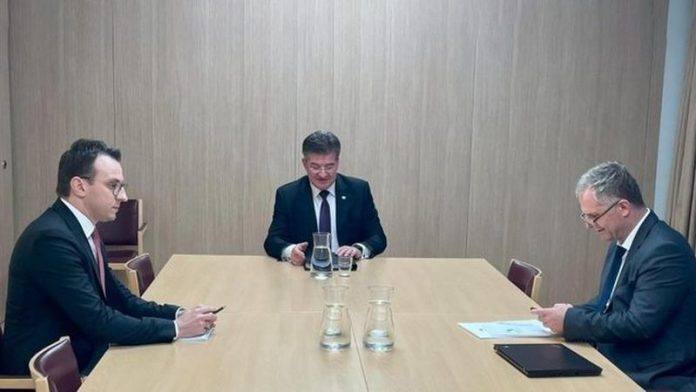Meetings between Kosovo and Serbia in Brussels on Monday over the use of the Serbian dinar in the country failed to yield results, with Kosovo Deputy Prime Minister Besnik Bislimi stating that he hoped the EU envoy for Kosovo-Serbia dialogue, Miroslav Lajčák, would schedule another meeting for the following week, according to Euractiv.
My opinion is that these proposals are still very far from each other. We tried to get closer, but it seems that an additional meeting is needed, maybe Lajčák will offer to hold it next week.
Bislimi also stated that Kosovo put forward two proposals for discussion during the meeting, but no further details were provided.
“We have two proposals. We know what each side’s focus is, but at this point, it would hurt the process more if we continued to present the details of the two proposals. I think that our side has issued a very constructive proposal that enables financial support to go to end users, but without injuring at any moment the regulations of the Central Bank of Kosovo and the legislative framework of our country.”
On 1 February, the Central Bank of Kosovo implemented a regulation making the euro the only currency for payment transactions in the country. This followed the fact that the euro had been the country’s official currency since 2002, with the 2008 Constitution stating that there was only one legal mean of payment.
Despite this, many Kosovo Serbs who refuse to accept Kosovo’s 2008 Declaration of Independence continue to use the dinar, avoiding the euro. Other currencies, including dollars, pounds, lek, and dinar, will continue to be allowed for exchange, in certain foreign currency accounts and in informal transactions between individuals.
However, all official payments must be made in euros, preventing large amounts of cash from entering Kosovo across the border, which raises concerns about organised crime and the traceability of funds. Meanwhile, in an attempt to give Kosovo Serbs a chance to adjust, the Kosovo government has imposed a three-month transition period for the rules to come into effect.
Kosovo and Serbia were directed last week to prepare proposals for the use of the Serbian dinar in Kosovo ahead of a meeting in Brussels. Kosovo argues that Serbia must make payments in euros or exchange them for euros before passing them through an existing and fully functional banking system, which Serbia refuses to do as it does not recognise Kosovo’s independence.
Kosovo Prime Minister Albin Kurti clarified that the dinar was not banned, despite Serbian statements and many incorrect media reports, and urged Serbs to join the country’s banking system. He stated that the central bank had offered the People’s Bank of Serbia services to convert dinars into euros and provided free euro bank accounts for all Kosovo Serbs. According to the Government, dinars could be deposited into those accounts and then withdrawn in euros, the official legal tender.
Belgrade’s hysteria over the central bank regulation stems from the imminent halt to its illegal cash pipeline into Kosovo, not concerns for Serbian citizens’ welfare.
The Speaker of the Assembly of Kosovo, Glauk Konjufca, stated that the decision on the dinar issue belonged to Kosovo and could not be reversed due to the fact that such a decision was necessary.
